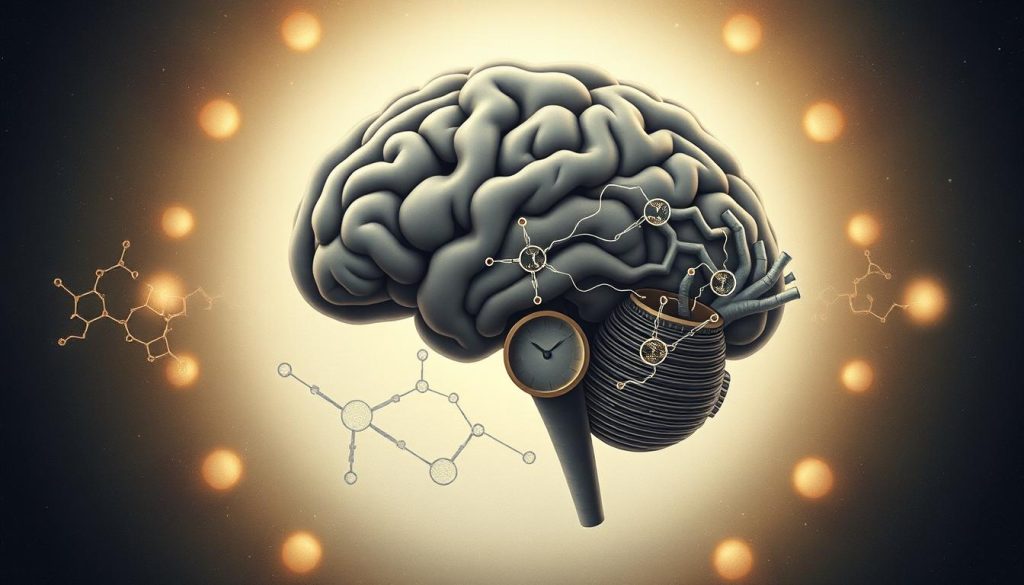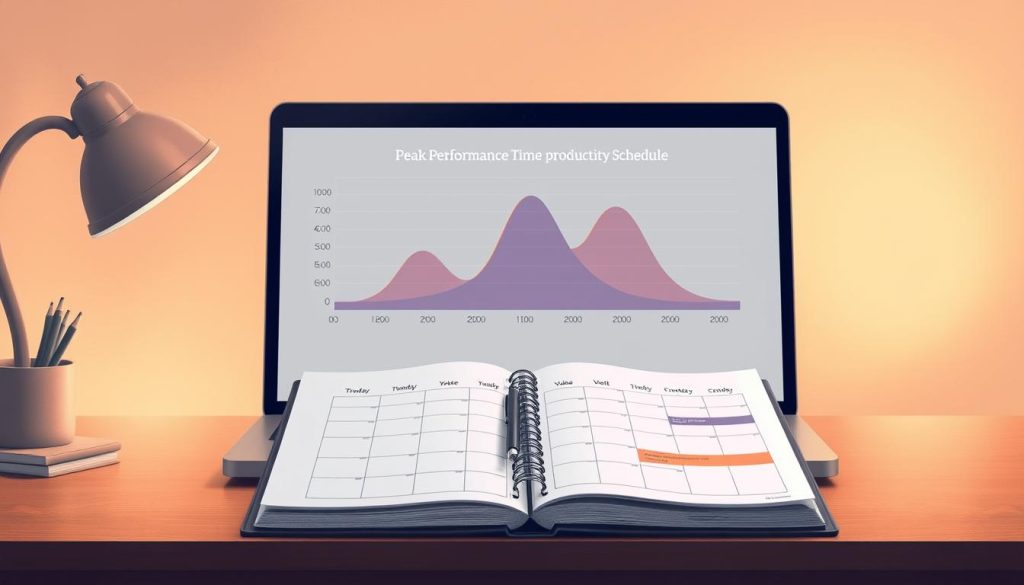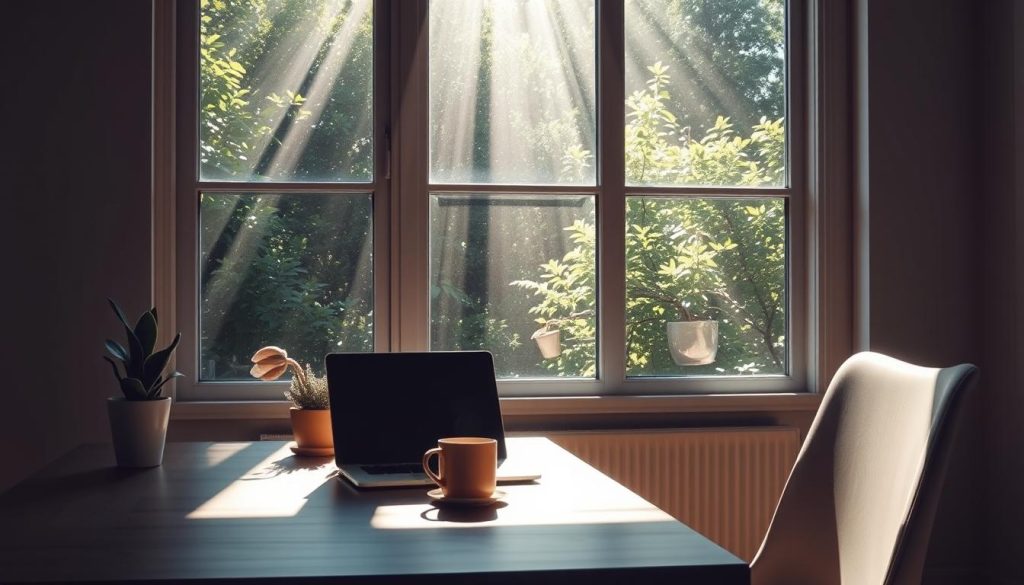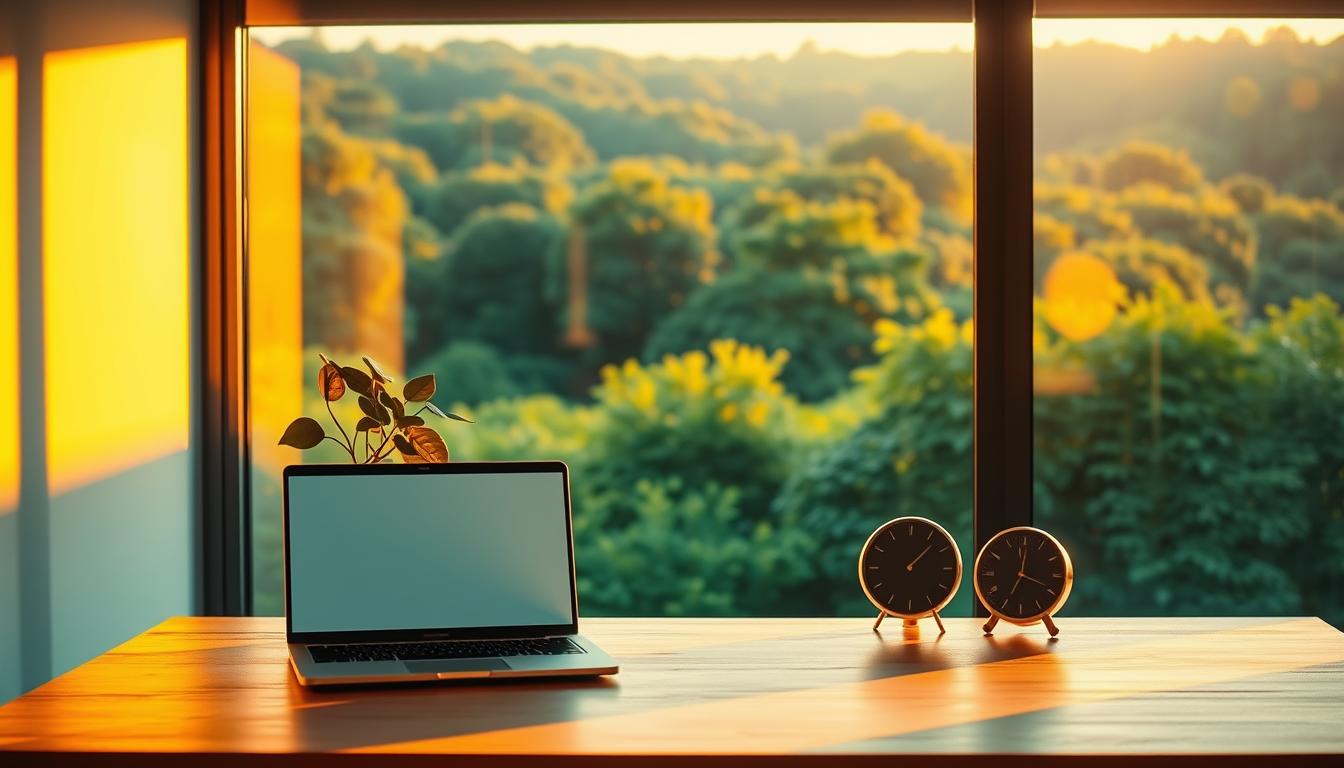Ever wonder why you feel sharp at certain times but sluggish at others? You’re not fighting laziness—you’re working against your biological clock.
Most people try to force peak performance at all hours. This approach backfires because it ignores how our bodies naturally function. Your energy levels rise and fall in predictable patterns throughout the day.
Chronobiology reveals the science behind these natural rhythms. This field shows us when our minds work best for different tasks. Instead of pushing through fatigue, smart workers align their schedules with their body’s design.
The secret isn’t working harder—it’s working smarter. When you match challenging tasks to your peak hours, everything becomes easier. Your focus improves, decisions come faster, and stress drops.
These circadian-based productivity hacks will transform how you approach your day. You’ll discover your personal energy patterns and learn to optimize them for maximum results.
Understanding Circadian Rhythms and Their Importance
Inside your cells, there’s a complex system of biological clocks. They control your daily energy patterns. By understanding these systems, you can match your activities with your body’s best times.
Your circadian system is like a conductor leading an orchestra. Every part of your body follows this rhythm. It affects when you’re most alert, your body temperature, and hormone releases.
What are Circadian Rhythms?
Circadian rhythms are your body’s 24-hour cycles. They control your body’s functions. These cycles are found in all living things, from bacteria to humans.
Your master biological clock is in your brain’s suprachiasmatic nucleus. It has about 20,000 neurons. It gets light signals and sends timing information to your body.

- Body temperature fluctuations throughout the day
- Hormone production and release timing
- Digestive system activity and metabolism
- Blood pressure and heart rate variations
- Immune system function and repair processes
How Circadian Rhythms Affect Productivity
Your circadian rhythms affect your focus, decision-making, and energy. Working against these rhythms can make you tired and less productive.
Research shows your brain works best at certain times. Most people are most alert from 10 AM to noon. This is when your brain is clear and focused.
Managing your energy means knowing these natural patterns. Your brain handles information differently at different times. Creative thinking is better in the evening, and solving problems is best when you’re alert.
Working against your natural rhythms causes social jet lag. This leads to constant tiredness, poor focus, and lower productivity.
Key Phases of Circadian Cycles
Your daily cycle has different phases. Each phase affects your energy and performance.
The morning phase starts around 6 AM. Cortisol, a wake-up hormone, peaks then. Your body temperature rises, and digestion starts.
The midday phase is when you’re most alert. From 10 AM to 2 PM, you’re focused and clear-minded. This is the best time for complex tasks.
The afternoon dip happens from 2 PM to 4 PM. Your body temperature drops, and you might feel sleepy. This is why you often feel tired after lunch.
The evening phase prepares you for sleep. From 6 PM to 9 PM, your body temperature falls, and melatonin increases. This is when you’re most creative.
Knowing these phases helps you manage your energy better. Instead of fighting your natural low-energy times, plan activities that fit your natural rhythm.
Timing Your Tasks for Maximum Efficiency
Smart professionals know that timing their tasks correctly can double their output without working harder. They match their most demanding work to their body’s natural energy cycles. This creates a powerful advantage in today’s competitive workplace.
Understanding when your mind operates at its sharpest allows you to tackle complex projects with greater focus and less stress. Your circadian rhythm creates distinct windows of opportunity throughout the day. These peak performance times vary from person to person.

Morning vs. Afternoon Productivity
The classic debate between morning larks and night owls has real science behind it. Research shows that about 25% of people are natural early birds. They hit their productivity stride between 6 AM and 10 AM.
About 25% of the population experience their peak performance times between 1 PM and 5 PM. Their brains warm up gradually throughout the morning. They reach optimal function during traditional afternoon hours.
The remaining 50% fall somewhere in between. They have moderate morning energy that sustains through mid-afternoon. Identifying your natural pattern requires honest self-assessment.
Track your energy levels hourly for one week. Note when you feel most alert and when concentration becomes difficult. This data reveals your personal productivity blueprint.
Strategic Breaks: When to Take Them
Effective time management strategies include planned recovery periods. Most people experience a predictable afternoon slump between 1 PM and 3 PM. This biological low point signals the perfect time for a strategic break.
The timing of breaks matters as much as their duration. A 15-minute walk during your natural energy valley can restore focus more effectively than a 30-minute break during peak hours. Morning people benefit from brief breaks around 10 AM and 2 PM.
Afternoon performers should pause around 11 AM and 4 PM. Active breaks that involve movement or fresh air provide better restoration than passive activities like scrolling social media. Your circadian rhythm responds positively to natural light exposure and physical activity during these planned pauses.
Optimizing Your Work Schedule
Creating a circadian-friendly schedule requires matching task difficulty to your energy levels. Schedule your most challenging cognitive work during your identified peak performance times. Save routine tasks like email management and administrative duties for your natural low-energy periods.
Creative work benefits from flexible scheduling that honors your biological rhythms. Many professionals find that brainstorming and problem-solving flow more easily during their natural peak hours. Meetings and collaborative work can be scheduled during moderate energy periods when social interaction feels manageable.
If your current job allows flexibility, gradually shift your schedule to better align with your circadian preferences. Even small adjustments, like starting 30 minutes earlier or later, can significantly improve your daily efficiency and job satisfaction.
The Role of Light in Productivity
Your body’s natural rhythms change a lot with light exposure. Light tells your brain when to be alert and when to relax. This can either help or hurt your productivity, based on how you use it.
Many people don’t realize how much light affects their work. The right light at the right time can make you up to 40% more focused. But bad lighting can make you feel tired and foggy all day.

Natural Light Benefits
Natural light is the best for setting your internal clock. Morning sunlight helps you stay alert and sleep better at night. It’s key for your daily rhythm.
At least 30 minutes of natural light a day can make you happier and more energetic. If you work inside, sit near a window. Even a little bit of natural light is better than artificial light.
If you can’t get to a window, short outdoor breaks help too. A 10-minute walk at lunch can refresh you and boost your afternoon work.
Smart Artificial Lighting
Artificial light is important when natural light isn’t available. Bright, cool-toned lights are best in the morning and midday. They help you stay alert and focused.
Adjustable LED lights are great for different tasks and times. Use them bright for detailed work and dim for creative tasks or evening activities. This helps follow your natural energy patterns.
Avoid harsh fluorescent lights to prevent eye strain and headaches. Instead, use a mix of overhead lighting and desk lamps for better control.
Blue Light Truth
Blue light is good during the day. It keeps you alert and helps with sleep. But it’s bad if you’re exposed to it at night.
Blue light from screens and bulbs can mess with your sleep if used too close to bedtime. Use blue light filters on devices after sunset or switch to warmer lights in the evening.
The trick is to use blue light wisely. It’s important for your daily routines when used correctly. Just be careful not to use it too much in the evening.
Nutrition and Circadian Rhythm Connection
Every bite you take affects your body’s natural rhythm. This creates a cycle that can either boost or drain your productivity. Your digestive system and brain work together, following a natural clock.
When you eat in sync with these rhythms, you get sustained energy and sharper focus. This is key for a productive day.
The timing of your meals sends signals to your internal clock. These signals help manage hormone production and metabolism. Knowing this lets you eat for peak performance.
Foods That Boost Focus and Energy
Certain foods work well with your circadian rhythms to keep energy levels steady. Foods like oats and quinoa give slow-burning fuel. They help your brain stay focused without energy crashes.
Protein-rich foods like eggs and legumes are key for staying alert. They support neurotransmitter production, helping you stay awake and focused.
Omega-3 fatty acids in fish and nuts support brain health. They help your cells work right, improving mental clarity and sleep.

Antioxidant-rich foods like berries protect your cells from damage. They help keep your internal clock balanced. These foods also give natural energy without artificial boosts.
Meal Timing: When to Eat for Peak Performance
When you eat matters as much as what you eat. Your digestive system works best at certain times. Eating big meals when you’re most active helps you use nutrients better.
Morning meals should have protein and healthy fats to start your day right. This combo gives you energy and keeps you focused. Avoid heavy breakfasts that can make you tired later.
Lunch should be eaten between 12 PM and 1 PM. This aligns with your body’s digestive peak. Choose meals with lean protein, complex carbs, and veggies for energy through the afternoon.
Evening meals should be light, eaten three hours before bed. Late eating messes with your sleep and hormone production. Opt for easy-to-digest foods to rest well.
Snacking can help if done right. Choose nutrient-rich snacks like nuts or fruit when you need a boost. Avoid sugary snacks that can mess with your energy.
Supplements and Their Impact
Some supplements can help your circadian rhythms and sleep. Melatonin, your sleep hormone, can reset your sleep patterns. Take it 30 minutes before bed to signal sleep time.
Magnesium helps your muscles relax and your nervous system work well. It supports a smooth transition to sleep. Evening magnesium can improve sleep quality and keep your rhythms consistent.
Vitamin D is important for your internal clock, especially in winter. It helps regulate your sleep-wake cycle. Consider supplements if you get little sun or live in the north.
B-complex vitamins boost energy and neurotransmitter production. They help your body use food for energy. Morning B-complex vitamins can keep you energized all day.
Adaptogens like ashwagandha help manage stress and keep your rhythms balanced. They support your body’s stress response. Consistent use can improve sleep and energy.
Remember, supplements are best with good nutrition and meal timing. They should enhance, not replace, a balanced diet that supports your natural rhythms. Always talk to a healthcare provider before starting supplements.
Creating a Circadian-Friendly Workspace
Your physical environment is key to keeping healthy circadian rhythms at work. A well-designed workspace boosts your work-life balance. It supports your natural energy cycles and helps you stay focused.
Design Tips for Enhanced Alertness
Place your desk near a window for more natural light in the morning. Use cool colors like blues and greens for walls to keep you alert. Adding plants like snake plants or pothos improves air and reduces stress.
Noise Control and Its Benefits
White noise machines or nature sounds help block out distracting sounds. Use sound-absorbing materials like fabric panels or bookshelves for quiet zones. Research shows that low background noise boosts creativity more than silence.
Evening Routines for Better Sleep
Set clear work and rest times for better balance. Dim your workspace lights 30 minutes before quitting to signal bedtime. Keep work out of your bedroom and have a relaxing space for sleep preparation.

